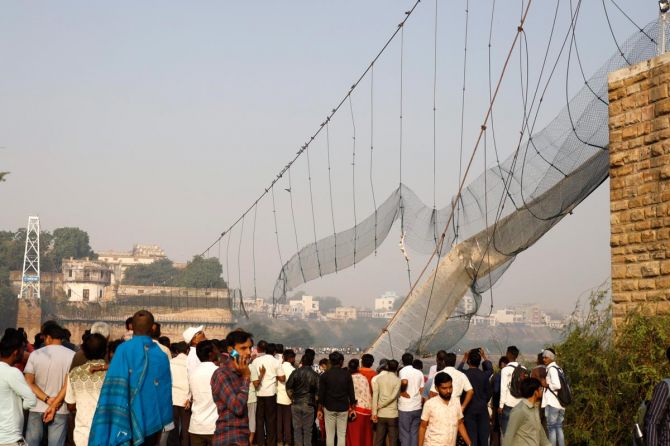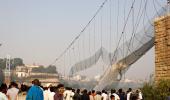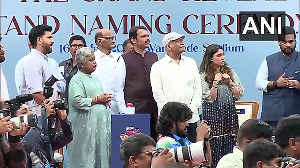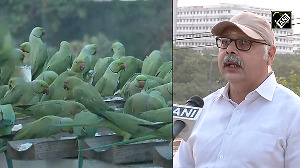The Gujarat high court on Wednesday asked the Morbi municipality as to how it allowed people to use the suspension bridge between December 29, 2021 and March 7, 2022, before it was closed for repair despite knowing that it was in a critical condition.

The British-era suspension bridge on the Machchhu river in Morbi town collapsed on October 30, five days after it was reopened following renovation, killing 135 people.
The HC sought the information from the Morbi municipality while hearing a suo motu (on its own) public interest litigation on the collapse of the bridge.
A division bench of Chief Justice Aravind Kumar and Justice Ashutosh Shastri also sought to know the reasons for allowing Ajanta Manufacturing Private Ltd (Oreva Group) to use the bridge despite there being no approval for utilisation.
The Ahmedabad-based Oreva group had been maintaining and managing the ill-fated suspension bridge.
In its affidavit filed on Wednesday, the Morbi municipality said that on December 29, 2021, Ajanta had informed the then chief officer of Morbi Nagarpalika that the condition of the bridge was critical and requested it to take a decision with regard to the draft agreement for the maintenance and management of the bridge which it had forwarded for approval.
"Even after communication dated December 29, 2021 intimating thereunder the subject bridge is critical, yet it seems to have been allowed to be utilised or used or permitted the public at large to use the said bridge till March 7, 2022," noted the court.
The court directed the Morbi municipality to disclose in its affidavit as to how Ajanta was permitted to use the bridge during this period.
"The reasons for allowing the said Ajanta to use the bridge despite there being no approval for utilisation shall also be indicated in the said affidavit. We also direct the present in-charge of Morbi municipality to be present on the next date of hearing physically before the court," it said.
Subsequently, an agreement was executed on March 8, 2022 between chief officer of Morbi Nagarpalika and Ajanta, entrusting the entire management of the bridge for a period of 15 years subject to the approval of the general board of Morbi Nagarpalika, the affidavit said.
"It is further averred in the affidavit that on October 26, 2022, without any prior approval (from the Morbi municipality), Ajanta reopened the bridge which had been closed for the public use between March 8 and October 25, 2022," the court noted.
Advocate Devang Vyas, appearing for Morbi municipality, said that the bridge was closed between March 8 and October 25, 2022, and was supposed to remain closed even thereafter.
Ajanta had in 2008 signed an MoU with the Collector of Rajkot district (Morbi was then in Rajkot district before it was carved out), for operation, maintenance, security, management, collection of rent, etc. for a period of nine years before the term expired on August 15, 2017, the affidavit said.
Even after the expiration of its term, the bridge continued to be maintained and managed by the company even in the absence of new agreement, it added.
The court said in its order, "Hence we hereby direct the Morbi Nagarpalika to place on record the copy of the approval granted by the general board of Morbi Nagarpalika, if any, approving the agreement dated March 8, 2022, and also to produce the communication dated December 29, 2021 forwarded by Ajanta to the chief officer of Nagarpalika, Morbi."
When the matter was first taken up for hearing in the morning, the court said it would impose a cost of Rs 1 lakh if Morbi nagarpalika did not file the affidavit by 4.30 pm the same day.
Its lawyer Devang Vyas filed the affidavit as directed.
On Tuesday, the high court had asked the state government as to why no expression of interest was invited for maintenance and operation of the British-era structure and how "largesse" was given to an individual without floating a tender.
It had wanted to know from the state government whether any steps were taken by the local authorities to float a tender for the bridge's operation and maintenance after the 2008 MoU expired in 2017.











